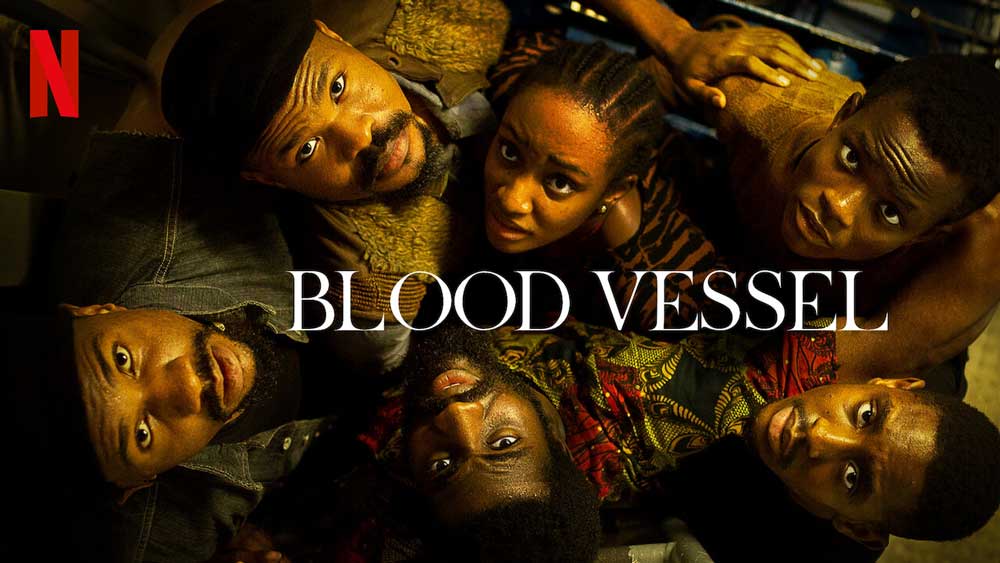“Blood Vessel,” the latest sensation on Netflix, is a captivating mystery and crime thriller produced by Roxanne Adekunle-Wright, Arafat Bello-Osagie, Agozie Ugwu, and directed by Moses Inwang, with Jeffrey Musa David serving as the director.
WATCH TRAILER
This compelling production, spearheaded by Charles Okpaleke and Play Network Studios, draws inspiration from a real-life story in Nembe, a community in Bayelsa State, Nigeria.

Boasting a stellar cast including Jidekene Achufusi, Bimbo Manuel, John Dumelo, Pere Egbi, Ebele Okaro Onyiuke, Adaobi Dibor, Francis Duru, David Ezekiel, and others, “Blood Vessel” unfolds a drama-laden narrative in the heart of the Niger Delta. The lives of Abbey, Boma, Degbe, Olotu, Tekena, and Oyin become intricately entwined as they unintentionally become stowaways on a mysterious vessel, embarking on a perilous journey filled with unforeseen dangers.
In their pursuit of safety and a brighter future, the six main characters find themselves aboard a ship bound for Brazil, courtesy of Mr. Perekemi. However, their voyage takes a tumultuous turn when Mr. Perekemi’s failing health forces his absence, leaving them vulnerable to the vessel’s owners, Igor and his team.
The movie assembles a cast that not only breathes life into their characters through action but also authentically captures the essence of the Nembe community through its language and culture. The film adeptly utilises language as a powerful communication tool, fostering a psychological intimacy with both the film’s setting and the characters.
Brought to life by a skilled ensemble cast, the characters infuse vitality into the narrative, allowing viewers to emotionally connect with their challenges and victories. As the characters confront obstacles, viewers embark on a profound journey that extends beyond the screen. The portrayal of the immigration experience is poignant, offering insights into the intricate dynamics of love and brotherhood.
In terms of production, “Blood Vessel” stands out with its cinematography and visual effects. The film skillfully captures the sharp contrast between the serene landscapes of the Niger Delta and the harsh realities faced by the characters.
The production team excels in prosthetic editing, particularly in the shooting scenes. The realism in scenes such as Onyin’s shooting is remarkable, with her authentic reaction and the convincing splash of blood contributing to the scene’s authenticity.
Similarly, in the scene where Igor was shot, the makeup was so well-executed that it appeared incredibly real on his head. The prosthetics team also deserves praise for their work on Boma’s makeup after he was skinned by Igor in the abbatoir – it looked remarkably authentic, creating the illusion that he was genuinely sliced. Kudos to the team for their meticulous work.
The film explores a myriad of themes, sparking discussions on youth immigration, the repercussions of oil spillage in the Niger Delta, systemic corruption in Nigeria, and the core theme of love.
At its core, the narrative revolves around the love shared between Oyin and Abbey, a love that transcends spiritual and physical consequences. The film also delves into brotherhood love, highlighting the unique bond between Olutu and Tekena, a connection that becomes a testament to sacrifice.
The film further addresses the chaos accompanying the discovery of oil in the Niger Delta, shedding light on the environmental and human toll resulting from oil spillage. It depicts the backlash from villagers attempting to combat this detrimental activity, which enriches the pockets of some while causing suffering and death for others.
Additionally, the movie exposes the activities of individuals in the illegal oil business, depicting Igor’s efforts to navigate through bribery and escape the clutches of those who do not succumb to corruption.
Taking a compelling turn, the narrative explores the consequences of Boma and Degbe’s actions, particularly their unintentional killing of a snake believed to embody the water god, setting the stage for tragic events within the vessel.
The film intriguingly weaves together threads of tradition and divine repercussions, revealing the complexities of the characters’ choices and the inextricable ties between their actions and the unfolding consequences.
Moreover, the movie mirrors the harsh realities of youth immigration and the corrosive effects of systemic corruption, elevating it beyond a mere love story to a thought-provoking commentary on societal issues.
Moses Inwang’s directorial finesse, coupled with a compelling script and outstanding performances, makes “Blood Vessel” a must-watch for those seeking a gripping and emotionally charged cinematic experience.
In summary, the review for “Blood Vessel” by 2709 Updates gives it a solid 8/10, recognising its compelling narrative, thematic complexity, and profound emotional resonance.
Advertisements
Tiwa Savage’s ‘Water and Garri’ Premieres on Prime Video on May 10
Renowned Afrobeats sensation Tiwa Savage is poised to grace the silver screen with her act…
















